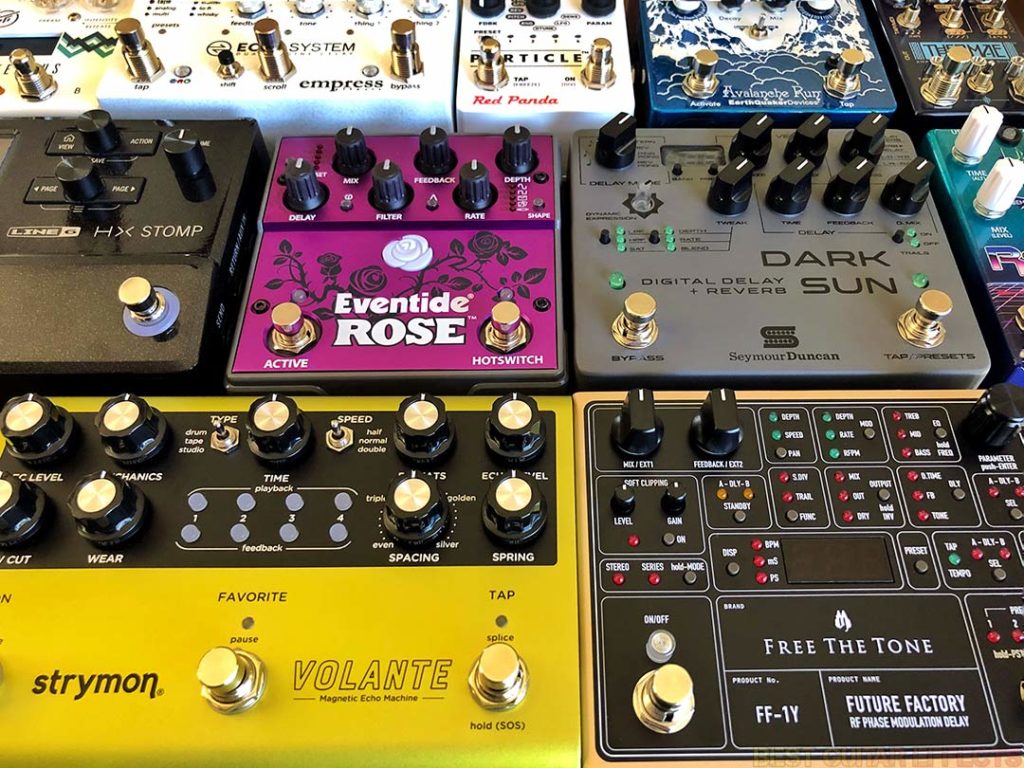Delay Pedals

by Pedro Lopez De Victoria
Delay–whether you are intimately familiar with it or just curious, it’s hard to get too far as a musician without hearing about this, the king of instrument effects. From Tape, to Analogue, to Digital, the history of delay is closely tied to the evolving sound of guitar-driven music. If you’re interested in perhaps doing some shopping for a pedal on your own, but find the number of varieties daunting, take a look at this handy guide:
What Is Delay?
First off, let’s address the fundamentals. Delay is an effect that is essentially a repetition, or echo, or a sound. Unlike a loop pedal, a delay will eventually stop. There are many different variations of that repetition, how it sounds and behaves, all of which you can tweak to your liking.
Where Do I Start?
The first question to ask yourself when buying a new delay pedal is, “What do I want this effect to help me with?” If you want a simple delay effect to thicken your guitar sound and add atmosphere, you need only to purchase a simple, cheap pedal; however, if you want to subvert, mutate, and experiment with the sound of your guitar (perhaps to the point where it doesn’t sound anything like a stringed instrument at all), this puts you in the higher price range. This spectrum ranges from simple and cheap to complex and expensive. Let’s explore this spectrum further.
Basic Delay (<$100 w/o bells and whistles)
A real, original tape delay could run you thousands of dollars, and is hard to keep up, but a cheap emulator of that equipment is easily attained (and will leave you more real estate on your pedal board). These basic delay pedals really only provide three different parameters, usually represented as knobs. The first, Mix, controls how much of the effect you want included in your sound (no effect = dry, all effect = wet). Then there’s Rate/Speed which dictates the rapidity of the delay effect. Finally, Feedback/Repeats controls how many repetitions of the sound you want.
You can have a lot of fun playing with these parameters, and can even get a pretty experimental sound (especially with the Feedback knob, though things can get a little messy); however, these don’t offer much in terms of creativity, and especially with digital delays, all you get is a crisp repeat of your sound, with no variation. This could be what you’re looking for, but if it isn’t, you may need to shell out some more.
Experimental Delay (>$100 w/ bells and whistles)
Once you enter a higher price range, you’ll encounter new ways to affect the effect, also known as Modulation. As stated above, some of these higher end pedals will be digital, thus you can expect a non-modulated, clean, bright repetition of your sound–almost a perfect copy. But if you want a darker delay to add a wavering, melty effect, you’ll find some of these pedals to have additional parameters, such as Depth. Just like a real tape, each repetition will have a depressed, melted quality. These additional effects will also have a rate control.
Also, there is Shape, which very serious delay pedals will use, wherein you can choose between a triangle or square shape. Without getting too in depth, basically this controls how the sound wavers. Triangle is standard, while the square shape cuts in and out.
Some delays get even more complicated, to the point where they are essentially small computers, with other effects built in, such as tap tempos, a stereo effect, or even its own looper.
Brands
Buying a delay pedal is a bit like buying a car. Some brands are known for one thing, while another can have its own proprietary benefits. Strymon is known for how well-built their pedals are, and while they generally don’t get terribly complicated, their pedals will last you forever. Eventide is also recommended, as they are known for making a lot of crazy effects. They often will combine delay and pitch shift with their pedals, and are considered by many to be an industry standard, featured on numerous recordings.
At the end of the day, everything boils down to how much you want to spend. And this depends on what you want to achieve. Who have you been listening to? Shoegaze bands? U2? There is a rich tapestry of delay effects out there, and this is only the beginning. The only way to find out where you stand is to go ahead, plug in, and give it a shot!
